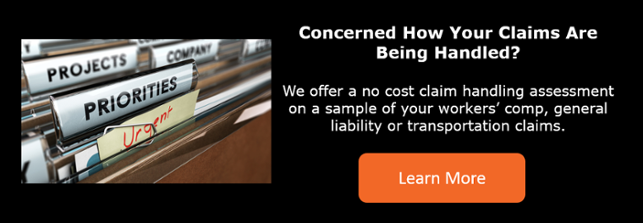
Make Workers’ Compensation Ignorance Your Advantage
 Employers: You may be missing opportunities to disrupt and re-focus wayward workers’ compensation claims. You can end the usual reality of waiting for your TPA’s adjuster to set a claim handling pace or strategy. Do you feel hesitant to ask for special help from an adjuster? I know some of you are responsible for WC oversight as an additional “hat” to wear alongside your real expertise in HR, Safety, Administration or other areas. The good news is you don’t need to be a workers’ compensation expert. Rather, you can use that fact to your advantage.
Employers: You may be missing opportunities to disrupt and re-focus wayward workers’ compensation claims. You can end the usual reality of waiting for your TPA’s adjuster to set a claim handling pace or strategy. Do you feel hesitant to ask for special help from an adjuster? I know some of you are responsible for WC oversight as an additional “hat” to wear alongside your real expertise in HR, Safety, Administration or other areas. The good news is you don’t need to be a workers’ compensation expert. Rather, you can use that fact to your advantage.
Let us first establish a critical reality: Claim adjusters will never feel your sense of urgency or concern over any of your company’s troublesome cases. This is not a derogatory shot at adjusters. Most adjusters juggle hundreds of challenging files and necessarily remain emotionally detached in order to survive their job. While you might be immediately anxious to know the outlook for a “bad” claim, your adjuster might be just as content, and technically proper, to diary it for 60 days before providing an update.
That said, good adjusters are giving proactive nuanced assistance to some of their clients every day. You can be one of those clients if you use the right approach.
Quick Tip: Plea Truthful Ignorance and Fear No Question or Request
 Don’t make it about the claim. Approach your adjuster as a client in need of expertise. This raises a professional obligation and higher calling in any good adjuster. You might say, “I need help and advice because I am not a workers' compensation expert. I know you have a grip on this stuff so can you spare me 15-20 minutes?” Notice you have not mentioned any claim yet. More importantly, you have relieved yourself of any responsibility to ask an “intelligent” question and need not feel “stupid” in putting anything whatsoever on the table.
Don’t make it about the claim. Approach your adjuster as a client in need of expertise. This raises a professional obligation and higher calling in any good adjuster. You might say, “I need help and advice because I am not a workers' compensation expert. I know you have a grip on this stuff so can you spare me 15-20 minutes?” Notice you have not mentioned any claim yet. More importantly, you have relieved yourself of any responsibility to ask an “intelligent” question and need not feel “stupid” in putting anything whatsoever on the table.
If this approach meets resistance from an adjuster (unfortunately not all of them are tuned-in to customer service), then call the supervisor with the same approach. A supervisor should be much more obligated to meet you at a client-service level. Your goal is to have a platform and discuss your specific claim issues. The supervisor can make that happen with the adjuster and may want to stay looped into the communications simply to see it through to your satisfaction. Do this once, and the adjuster will most likely not put you off the next time.
Once you have a platform, bring up the specific claim. Ask bold questions, general questions, or make assertions from your perspective. Lay out the specific issues of your concern. Don’t be afraid to speak in layman’s terms as this begs your adjuster to better explain things to you. Just a few examples to give you a flavor include:
-
Why is this still open?
-
Can we settle this claim? What do we need to do to get to that point?
-
I don’t think this person wants to work.
-
Here is what is happening on the HR side of this claimant; how does this impact the claim?
-
I am worried about the prescriptions this person is taking. Can we end these drugs?
-
Can we deny this claim?
-
What about all the prior injuries/surgeries/medical problems this employee has?
-
We have heard that this claimant might be working/vacationing/participating in, etc.
-
I need help because my boss is asking me about (whatever questions) on this claim.
-
Why is this reserve so high? Can it come down?
-
Can we set up a conference call to include our defense attorney and my boss?
Conclusion
In all conversations, treat the adjuster as a trusted advisor and a skilled professional. Voice your frustrations as an underpinning of your need for help but do not direct them at the adjuster. You can emerge as one of the chosen few clients who will get good adjuster’s attention and appreciation going forward.


